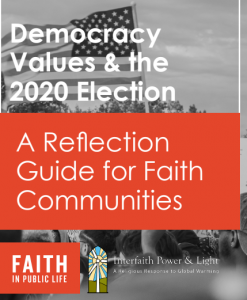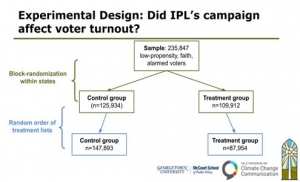Reprinted from the national IPL Blog
The Results are in: 2020 Faith Climate Justice Voter Campaign Research Shows Campaign had a Measurable Impact
By Tiffany Hartung, Field Director
IPL’s 2020 Faith Climate Justice Voter Campaign inspired and mobilized people of faith to take a critical climate action: voting.
Congregations, faith communities, and volunteers around the country helped mobilize faith voters to vote their values of caring for Creation and loving our neighbors.
 While 2020 was IPL’s first civic engagement campaign at such scale, we were able to build a multi-faith, multiracial coalition. The campaign worked nationally with a focus on seven states where IPL state affiliates organized by collecting voter pledges, recruiting faith leaders to give sermons, distributing a voter guide through congregations, and commissioning a poll of religious voters. Our work grew into a multi-faith coalition of groups also doing their first-time civic engagement work at scale.
While 2020 was IPL’s first civic engagement campaign at such scale, we were able to build a multi-faith, multiracial coalition. The campaign worked nationally with a focus on seven states where IPL state affiliates organized by collecting voter pledges, recruiting faith leaders to give sermons, distributing a voter guide through congregations, and commissioning a poll of religious voters. Our work grew into a multi-faith coalition of groups also doing their first-time civic engagement work at scale.
A couple months into the pandemic, people were attending worship services by Zoom, which made organizing congregants extremely challenging. IPL made the decision to reach out to faith voters beyond our base, given our base supporters were already good voters. With the help of the Yale Program on Climate Change Communication (YPCCC), we crafted a campaign to reach out to infrequent faith voters likely to be receptive to climate messages. For four states, we created an experiment to measure the impact of that voter outreach.
The Experiment
We knew we wanted to reach infrequent voters, people of faith, and people with whom a climate message would resonate.
 We crafted an experiment with this research question: Does the text campaign increase voter turnout among the treated group who received messages from IPL volunteers?
We crafted an experiment with this research question: Does the text campaign increase voter turnout among the treated group who received messages from IPL volunteers?
We created a list of 235,847 infrequent (low-propensity), likely to be climate alarmed, religious voters in North Carolina, Minnesota, Michigan, and New Hampshire.
Voters were randomly assigned to a treatment or control group. The order of the lists were randomized, so that anybody who wasn’t texted because volunteers didn’t make it all the way through the list was considered randomly assigned to the control group. Roughly half of the list was held as a control group and did not receive any communication from IPL.
Voters in the treatment group received text messages from IPL volunteers working on the campaign.
Our campaign incorporated voter outreach best practices of a voter pledge, sharing our non-partisan multi-issue faith voter discussion guide, asking them to get three friends to vote, and get out the vote.
Experiment Results
The analysis shows that IPL’s voter outreach program increased voter turnout by 1.7 percentage points. The model suggests that 1,455 additional people voted because of the campaign.
These results show that this portion of IPL’s voter outreach program had a measurable impact. In fact, other studies show texting to increase voter turnout by about 0.5 percentage points.
While this experiment did not encompass the full breadth of our campaign work, it does provide a snapshot of our campaign impact. IPL will apply this learning to our future voter outreach and civic engagement. Stay tuned for our 2022 Faith Climate Justice Voter campaign.
LTE in Albuquerque Journal on Danger of Methane Emissions
/in Campaigns, Featured Articles, NEWS /by admin(Kayley Shoup, an organizer for Citizens Caring for the Future, an affiliate of New Mexico Interfaith Power & Light, published this letter to the editor in the Albuquerque Journal on June 29).
A daily threat
Emissions Pose Threats to Frontline Communities
By Kayley Shoup
Carlsbad Resident
Just this month I was out in the oil fields of the Permian with Earthworks looking for emission events. It was upward of 105 degrees every single day. Prior heat records were being broken. It was something else to quite literally be feeling the effects of climate change while also seeing through a FLIR video camera the emissions that are significantly contributing to that climate change. It was memorable to say the least.
As I drove home from the oil fields each night, I thought about how scared I was that my community is breathing the emissions I had just seen into our lungs every single day. I thought about how so few people in my tiny hometown realize what danger our health is in. The risks are not communicated by industry or the agencies that are supposed to protect us. I thought about the oilfield workers that are directly exposed to the pollution every single day, and how their lives might be upended by disease in the future. I thought about how many emissions events I had seen in just one day, and the I shuddered remembering there is only one air monitor in my town and no air inspectors in New Mexico who live in the Permian.
I thought about how cancer runs in my family, and how the pollution I’m exposed to may ensure I die young. I thought about my 51-year-old mother who has just finished treatment for ovarian cancer, and how terrified I am that pollution could contribute to the recurrence of her cancer. I thought about how everyday I am learning my community is a sacrifice zone.
I naively thought I was being protected by federal and state environmental agencies. I blindly trusted my government and I blindly trusted industry, but sometimes the truth slaps you in the face and wakes you up. I am involved today because living in a frontline community has awakened me to the fact some communities, some families, some human beings really are seen as disposable. I’ve seen first-hand a culture that values the state of the economy more than a child’s life. I realized something was wrong when I pieced together that I knew more young people with rare and aggressive cancers than the total number of people my 80-year-old grandmother has known throughout her life that had cancer. This is a reality for you people on the front lines. Whether or not they realize that the devastation they face in their life could well be attributed to pollution caused by emissions does not change the fact that devastation exists.
Methane rules are more than just rules. These rules mean a mother doesn’t have to watch her child go through leukemia. They could mean a young man doesn’t lose his hardworking father at a young age. They could mean a grandmother could breathe easy into her old age. They could mean a young couple’s dream of a family isn’t dashed by reproductive issues.
Frontline communities suffer the most when common-sense action isn’t taken, but because of climate change everyone in the world is essentially living in a sacrifice zone in one way or another, whether their community is constantly threatened by natural disaster or riddled with disease. Methane emissions affect us all. I hope the EPA chooses to take bold and swift action to make methane rules that sustain life.
A Successful 2020 Faith Climate Justice Voter Campaign
/in Campaigns, Faithful Citizenship, Featured Articles, NEWS /by adminReprinted from the national IPL Blog
The Results are in: 2020 Faith Climate Justice Voter Campaign Research Shows Campaign had a Measurable Impact
By Tiffany Hartung, Field Director
IPL’s 2020 Faith Climate Justice Voter Campaign inspired and mobilized people of faith to take a critical climate action: voting.
Congregations, faith communities, and volunteers around the country helped mobilize faith voters to vote their values of caring for Creation and loving our neighbors.
A couple months into the pandemic, people were attending worship services by Zoom, which made organizing congregants extremely challenging. IPL made the decision to reach out to faith voters beyond our base, given our base supporters were already good voters. With the help of the Yale Program on Climate Change Communication (YPCCC), we crafted a campaign to reach out to infrequent faith voters likely to be receptive to climate messages. For four states, we created an experiment to measure the impact of that voter outreach.
The Experiment
We knew we wanted to reach infrequent voters, people of faith, and people with whom a climate message would resonate.
We created a list of 235,847 infrequent (low-propensity), likely to be climate alarmed, religious voters in North Carolina, Minnesota, Michigan, and New Hampshire.
Voters were randomly assigned to a treatment or control group. The order of the lists were randomized, so that anybody who wasn’t texted because volunteers didn’t make it all the way through the list was considered randomly assigned to the control group. Roughly half of the list was held as a control group and did not receive any communication from IPL.
Voters in the treatment group received text messages from IPL volunteers working on the campaign.
Our campaign incorporated voter outreach best practices of a voter pledge, sharing our non-partisan multi-issue faith voter discussion guide, asking them to get three friends to vote, and get out the vote.
Experiment Results
The analysis shows that IPL’s voter outreach program increased voter turnout by 1.7 percentage points. The model suggests that 1,455 additional people voted because of the campaign.
These results show that this portion of IPL’s voter outreach program had a measurable impact. In fact, other studies show texting to increase voter turnout by about 0.5 percentage points.
While this experiment did not encompass the full breadth of our campaign work, it does provide a snapshot of our campaign impact. IPL will apply this learning to our future voter outreach and civic engagement. Stay tuned for our 2022 Faith Climate Justice Voter campaign.
Register for Laudato Si Conference in July
/in Featured Articles /by adminLaudato Si and the Catholic Church
A Conference Series on Our Common Home
See the schedule and learn more
The conference is free, but registration is required, and a donation is encouraged to offset costs that include Spanish language interpretation.